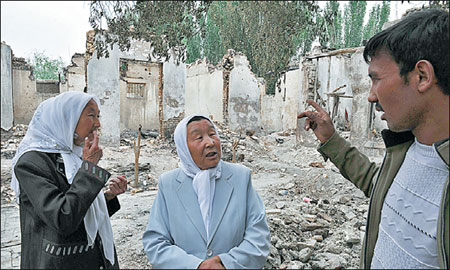
WASHINGTON, May 2 (Xinhua) -- This week marked 100 days since U.S. President Barack Obama's re-election, but times are rough for the president at a time of bitter partisan rivalry.
The last three months have seen little movement on budget legislation or gun control -- two of the major issues on Obama's legislative agenda.
Despite public outcry after December's grizzly attack on Sandy Hook Elementary School in Connecticut that ended in the deaths of 20 school children, a bill banning assault weapons and expanding background checks for gun purchasers was defeated in the Senate last month.
To add to Obama's difficulties in passing what he billed as much-needed gun laws, many Americans seem to be against such reforms.
"Congress and the president have been unable to pass gun legislation because many Americans own guns and want to keep them and reform advocates are pretty weak," Brookings Institution Senior Fellow Darrell West told Xinhua in an interview.
"Although Americans in general favor background checks, they aren't big proponents of gun reform and don't want to give up guns or ammunition magazines," he said.
West added that the National Rifle Association remains a power player and is especially strong in rural America, contending the failure of the legislation reflects the continuing power of rural areas in American politics.
The last three months have also seen much division on the budget front.
The "fiscal cliff" negotiations saw neither Congress nor Obama willing to budge until a day after the deadline, when lawmakers cut a deal. The sequester -- an 85 billion U.S. dollar spate of spending cuts that kicked in March 1 -- was predicted to further slow the sluggish economy by 0.5 percent, and Republicans allowed the cuts to go through despite Obama's protests that the cuts were a "meat cleaver" approach that would slash helpful government programs.
West said Congressional Republicans and the White House have difficulties seeing eye to eye on a budget because of fundamentally different world views.
"The budget is a proxy for larger disputes about the role of government," he said.
Republicans retain a majority in the House so they are able to block action from their side of the Congress. Democrats have majority control in the Senate, but the super-majority requirement of 60 votes to break off filibusters makes it hard for any proposal to pass, West said.
However, Dan Mahaffee, an analyst with the Center for the Study of the Presidency and Congress, said there have been a few small signs of bipartisanship that could signal a willingness to compromise down the road.
Those include a bipartisan agreement on avoiding a government shutdown in March, Mahaffee told Xinhua, adding that the two parties also mitigated the impact of the sequester. Obama in March also dined with key Senators from both parties, he noted.
Obama's budget, which he put forth last month, met some Republican requests in terms of Social Security reforms, he added.
The president also rang a hopeful note at a White House press briefing Tuesday when he said a Senate bill overhauling the nation's broken immigration system met all requirements he thought were needed. Criteria include beefed-up border security coupled with a path to citizenship for undocumented immigrants who have been in the U.S. for a long time.
For much of Obama's first term, critics have blasted the president for what they billed lackluster leadership, but Mahaffee called the charges unfair, arguing that president is dealing with a divided Congress.
Meanwhile, the nation remains mired in high unemployment, a factor attributable to lackluster demand, but also, economists said, to business' uncertainty due to Washington's inability to cooperate.
With last month's job growth of 88,000 being far lower than last year's average increase of 183,000, analysts expressed concern.
While the jobless rate ticked down to 7.6 percent in March from the previous month's 7.7 percent, the fall was due primarily to people dropping out of the labor force, economists said. 
















 Huge rubber duck visits Hong Kong
Huge rubber duck visits Hong Kong


![]()
